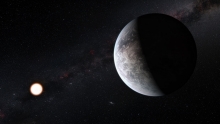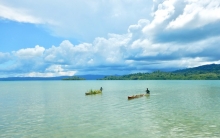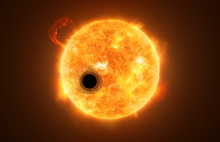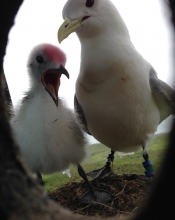
Viruses can ‘hijack’ cellular process to block immune response
Research led by McGill University and Queen’s University Belfast has found that viruses can ‘hijack’ an existing molecular process in the cell in order to block the body’s antiviral immune response to a viral infection.
The results of the study have been published in the journal Molecular Cell.

Crocodile evolution rebooted by Ice Age glaciations
Crocodiles are resilient animals from a lineage that has survived for over 200 million years. Skilled swimmers, crocodiles can travel long distances and live in freshwater or marine environments. But they can’t roam far on land.

Gender gap: Women represent two-thirds of doctorates, but hold only one-third of academic jobs
Women today represent two-thirds of all Canadian doctorates in archaeology, but only one-third of Canadian tenure-stream faculty. While men with Canadian PhDs have done well in securing tenure-track jobs in Canada over the past 15 years, women have not, according to a new study from McGill University. The current COVID-19 pandemic is likely to exacerbate these existing inequalities.

Astronomers uncover mysterious origins of ‘super-Earths’
Mini-Neptunes and super-Earths up to four times the size of our own are the most common exoplanets orbiting stars beyond our solar system. Until now, super-Earths were thought to be the rocky cores of mini-Neptunes whose gassy atmospheres were blown away.

How accurate are first impressions on a first date?
The high stakes of first dates require would-be partners to make and interpret first impressions. But, can we rely on these first impressions to accurately assess someone’s personality? According to researchers from McGill University, the answer is yes, although it may be more difficult than in more casual settings.

Happiness really does come for free
Economic growth is often prescribed as a sure way of increasing the well-being of people in low-income countries, but a study led by McGill and the Institute of Environmental Sciences and Technologies at the Universitat Autònoma de Barcelona (ICTA-UAB) suggests that there may be good reason to question this assumption.

When the bloom is off: why do some plants produce small and unattractive flowers?
Picture a flower: what do you see? A bright and showy splash of contrasting colours? Well, not all plants produce flowers that are only like that. Some plant species actually produce two types: “normal” ones that look great, and “runts” that are small, never open and, rather than attract pollinating insects, instead pollinate themselves.

Biodiversity is its own catalyst – to a point
For decades, scientists have wrestled with rival theories to explain how interactions between species, like competition, influence biodiversity. Tracking microbial life across the planet, researchers from McGill University show that biodiversity does in fact foster further diversity in microbiomes that are initially less diverse. However, diversity rates plateau with increased competition for survival and space in more diverse microbiomes.

LSD may offer viable treatment for certain mental disorders
Researchers from McGill University have discovered, for the first time, one of the possible mechanisms that contributes to the ability of lysergic acid diethylamide (LSD) to increase social interaction. The findings, which could help unlock potential therapeutic applications in treating certain psychiatric diseases, including anxiety and alcohol use disorders, are published in the journal PNAS.

Methane emissions from abandoned oil and gas wells underestimated
Bubbles of methane gas in water around an unplugged oil/gas well in Pennsylvania. CREDIT: Mary Kang

Discovery of new praying mantis species from the time of the dinosaurs
Artist’s interpretation of Labradormantis guilbaulti in liftoff among the leaves of a sycamore tree, Labrador, around 100 million years ago. The interpretation is based on fossils (for the wings) and living and extinct relatives (for the rest of the body). Fossilized sycamore leaves have been found in the same deposits as the mantis wings and show that this new insect species would have lived in a lush warm temperate forest during the Cretaceous. CREDIT: A. Demers-Potvin

A ‘super-puff’ planet like no other
The core mass of the giant exoplanet WASP-107b is much lower than what was thought necessary to build up the immense gas envelope surrounding giant planets like Jupiter and Saturn, according to a Canadian-led team of astronomers, including McGill University Professor Eve Lee.

Using artificial intelligence to manage extreme weather events
Can combining deep learning (DL)— a subfield of artificial intelligence— with social network analysis (SNA), make social media contributions about extreme weather events a useful tool for crisis managers, first responders and government scientists? An interdisciplinary team of McGill researchers has brought these tools to the forefront in an effort to understand and manage extreme weather events.
McGill researchers launch Multicultural Mental Health Resource Centre
Bell Let's Talk, McGill University, The Neuro (Montreal Neurological Institute-Hospital) and the Lady Davis Institute at the Jewish General Hospital are pleased to announce the official launch of the Multicultural Mental Health Resource Centre (MMHRC).

Well-built muscles underlie athletic performance in birds
Muscle structure and body size predict the athletic performance of Olympic athletes, such as sprinters. The same, it appears, is true of wild seabirds that can commute hundreds of kilometres a day to find food, according to a recent paper by scientists from McGill and Colgate universities published in the Journal of Experimental Biology.

